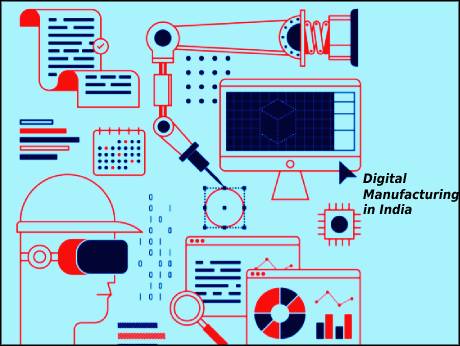
Mumbai, March12, 2021: A research study by Gateway House conducted in partnership with Export-Import Bank of India (India Exim Bank) along with the guidance of Progressive Policy Institute, Washington D.C. titled “Digital Manufacturing in India” examines how India has the potential to become a global manufacturing hub if it speeds up the adoption of digital manufacturing.
The COVID-19 pandemic has accelerated digitisation across the world, and India has been a key participant in this pursuit. The possible realignment of supply chains away from China, offers a significant opportunity for India to modernise its manufacturing with digitisation.
At present, digital manufacturing in India runs in parallel with global efforts in technology, with limited scale. However, for it to be truly successful, it must scale up, and especially be adopted widely by small and medium enterprises which are ready for the take-off.
Says Manjeet Kripalani, Executive Director and co-founder, Gateway House: Indian Council on Global Relations: “Digital manufacturing is the next wave of business globalization, which, post-pandemic is not just blind automation to save costs but the smart use of digital tools to modernise industry and create good quality jobs. Digital manufacturing is the next leap for India’s tech leadership - the first being the software outsourcing movement in the 1990s. This time around, government incentives are aligning with industry interests. It offers India a chance to reposition itself globally, and play a leadership role in the Industry 4.0 future.”
The research study was launched by David Rasquinha, Managing Director & CEO, India Exim Bank in the presence of prominent representatives from the Government of India and India Inc. at an online Roundtable organised on March 10, 2021.
In his opening remarks, Rasquinha said “Disruptive technologies have created a new realm of opportunities, in today’s increasingly interconnected and complex world. Traditional businesses need to transform into digital enterprises to meet the changing needs of their customers, and stakeholders, while remaining cost-effective and competitive. A digital transformation— one that’s real-time, intuitive, automated, secure, and open— is imperative for businesses to survive in this highly competitive world. MSMEs would remain the key enablers in driving Industry 4.0 while playing a vital role in this journey of transformation of the Indian manufacturing sector”.
The study is the culmination of more than a year of in-depth research and field visits focused on the country’s pre-and-post-COVID digital manufacturing ecosystems. The timing of the study is opportune, as the pandemic has accelerated the adoption of digital manufacturing in India as also globally. Within India, digital adoption on the shopfloor has outpaced global peers on many counts. Companies that saw it as an option, now understand it as a business imperative.
Adds N. Ramesh, Deputy MD, India Exim Bank: “In future, technological innovation could also lead to a supply-side miracle, with long-term gains in efficiency and productivity. R&D infusion would play a critical role in uplifting the manufacturing sector to its desired level and enhance productivity and innovation-driven growth”.
“India Exim Bank through its new Ubharte Sitare Programme would strive to identify and support fundamentally strong Indian companies, which could be future champions with good export potential in select manufacturing and service sectors, having unique value proposition in respect of technology, products or processes that are matching with global requirements”.
Recommendations
- Creation of a manufacturing excellence programme to recognize Indian MSMEs for digital adoption akin to the World Economic Forum’s Light House Network.
- Publication of a pan-nation centralized directory of Industry 4.0 start-ups mapping their capabilities on government portal to facilitate wider market access for start-ups that run on thin marketing budgets.
- Synergizing efforts of academic institutions and industry to create an affordable ecosystem for upskilling of manufacturing workforce and inhouse faculty.
- Accelerated end-to-end digital adoption by Indian manufacturing MNCs in order to benefit from the global shifts in supply chains and establish India firmly as an Industry 4.0 enabled manufacturing hub.
The full paper, Digital Manufacturing in India can be read here or at https://www.eximbankindia.in/research-papers
Indian Council on Global Relations is a foreign policy think tank in Mumbai, India, established to engage India’s leading corporations and individuals in debate and scholarship on India’s foreign policy and the nation’s role in global affairs.
Gateway House is independent, non-partisan and membership-based working towards co-designing perspectives on global issues that are important to India with a focus to taking India from a global rule taker to rule maker.